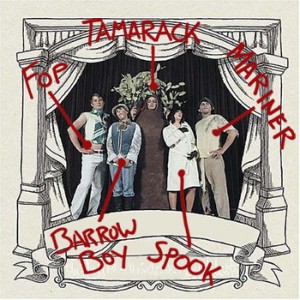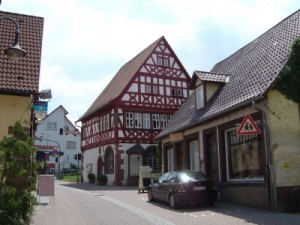The Annotated Decemberists No. 8: “Here I Dreamt I was an Architect”
 Perhaps no band’s lyrics better lend themselves to pseudo-academic analysis than those of The Decemberists. The Annotated Decemberists is an attempt to puzzle through the Portland, Oregon, group’s entire catalog song by song—examining all the obscure vocabulary, historical references and poetic subtext—or go crazy trying.
Perhaps no band’s lyrics better lend themselves to pseudo-academic analysis than those of The Decemberists. The Annotated Decemberists is an attempt to puzzle through the Portland, Oregon, group’s entire catalog song by song—examining all the obscure vocabulary, historical references and poetic subtext—or go crazy trying.
When Colin Meloy plays this song live, either solo acoustic or with the rest of The Decemberists, he often combines it with a partial cover of “Dreams” by Fleetwood Mac—a tacit acknowledgment by Meloy of the songs’ similarities. It’s not just that they’re built around the same two-chord progression (complete with liberal use of major-sevenths and sixths) or that dreams figure heavily in both. They both carry the same sense of resigned sadness.
Of course, only one contains a possible reference to a World War II death camp, and it ain’t Stevie Nicks’.
“Here I Dreamt I Was an Architect”
from Castaways and Cutouts, 2002

And here I dreamt[1] I was a soldier
And I marched the streets of Birkenau[2]
And I recall in spring
The perfume that the air would bring
To the indolent[3] town
Where the barkers[4] call the moon down[5]
The carnival was ringing loudly now
And just to lay with you
There’s nothing that I wouldn’t do
Save[6] lay my rifle down
And try one, and try two
Guess it always comes down to
Alright, it’s OK, guess it’s better to turn this way
And I am nothing of a builder
But here I dreamt I was an architect
And I built this balustrade[7]
To keep you home, to keep you safe
From the outside world
But the angles and the corners
Even though my work is unparalleled[8]
They never seemed to meet
This structure fell about our feet
And we were free to go
And try one, and try two
Guess it always comes down to
Alright, OK, guess it’s better to turn this way

And here in Spain I am a Spaniard[9]
I will be buried with my marionettes
Countess and courtesan[10]
Have fallen ‘neath my tender hand
When their husbands were not around
But you, my soiled teenage girlfriend
Or are you furrowed like a lioness[11]
And we are vagabonds[12]
We travel without seatbelts on
We live this close to death
And try one, and try two
Guess it always comes down to
Alright, it’s OK, guess it’s better to turn this
But I won, so you lose
Guess it always comes down to
Alright, it’s OK, guess it’s better to turn this way
- Either “dreamed” or “dreamt” is an acceptable way to conjugate the verb “dream” for the past tense. Since “dreamed” is more common in modern American English, this usage immediately establishes a mood of bygone times.↑
- The name Birkenau is most infamously associated with the site of the largest mass murder in human history: the death camp of the Auschwitz complex in Poland, where at least 1 million people, mostly Jews, were exterminated by the Nazis between 1942 and 1945. Birkenau literally means “birch grove” in German, and birch trees were indeed plentiful in the area chosen for the camp’s construction. Also in the area was the village of Brzezinka, which similarly took its name from the Polish word for birch trees. This was a small, agricultural community, however, and it doesn’t sound like it had any streets to patrol, especially after the the farm buildings were demolished to make way for the 40-square-kilometer camp. This leaves us with three options: 1) The narrator is imagining himself as an SS guard walking the “streets” formed by rows of barracks; 2) The song is actually referring to the west German municipality of Birkenau—which does have quaint, cobblestone streets—and the song has nothing to do with the Holocaust (which would explain why the rest of the verse is all about carnivals and fragrant spring nights); or 3) Colin Meloy was unaware that there was not a city of Birkenau outside the camp, and, whatever, this is all a dream anyway.↑
- “adj. disliking or avoiding work; idle; lazy”↑
- “n. 1 an animal, person, or thing that makes a barking sound 2 a person in front of a side show, theater, store, etc. who tries to attract customers by loud, animated talking.” Though obviously referring to the second definition, this line seems to include a play on words, since dogs also bark at the moon.↑
- The Wiccan ritual of “Drawing Down the Moon” is sometimes referred to as “Calling Down the Moon.” In formal settings performed by a high priestess but now often practiced by solitary Wiccans, the ritual involves entering a trance and calling on the Goddess, who is represented by the moon, to enter your body. Calling Down the Moon is also a 1995 album by the Welsh prog-rock band Man.↑
- “conj. except; but”↑
- “n. a railing held up by balustrers.” And what is a baluster, you ask? “n. any of the small posts that support the upper rail of a railing, as on a staircase.”↑
- An ironic play on words: For an architect’s work to be unparalleled, he must be able to keep the supports parallel.↑
- a quasi-tautophrase↑
- “n. a prostitute; esp., a mistress of a king, or a man of wealth or nobility”↑
- In France, what we call “frown lines” in English are known as rides du lion, literally “lion wrinkles.” In case you haven’t noticed, lions’ brows do get awfully furrowed, especially when they are snarling.↑
- “n. 1 a person who wanders from place to place, having no fixed abode 2 a tramp 3 an idle, disreputable, or shiftless person”↑